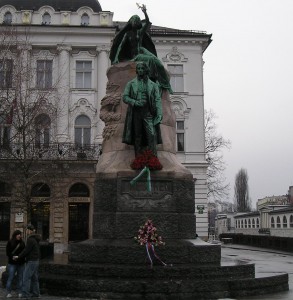I think I may have mentioned him briefly before, but today is the anniversary of the death of France Prešeren and a national holiday here in Slovenia. Prešeren was a 19th Century Romantic poet, the father of Slovene literature, and a major national hero.

France Prešeren statue in Ljubljana. The figure above Prešeren is his great unrequited love and poetic muse, Julija Primic.
I have to say, I kind of admire the fact that Slovenians have a poet, and not a king or a general as their most beloved national figure. I also think Prešeren sounds pretty awesome: it’s almost as if he deliberately set out to embody every single stereotype of a Romantic poet.
Born to a peasant family, Prešeren had a great and tragic unrequited love for Julija Primic, a wealthy merchant’s daughter, who features prominently in his work. He married, but still carried on affairs with other lovers. He tried to take his own life at least twice, and went largely unappreciated while he was alive, only to be posthumously hailed as a genius. Oh, and of course, he was an epic and notorious drunkard.
In fact, the Slovenian national anthem takes its lyrics from a poem by Prešeren titled Zdravljica (A Toast) that’s largely about drinking (I feel I’m in no position to criticize, since my national anthem is set to the tune of an English drinking song). The Prešeren poem (in translation by Janko Lavrin) reads as follows; the bolded section is used in the anthem:
The vintage, friends, is over,
And here sweet wine makes, once again,
Sad eyes and hearts recover
Puts fire into every vein.
Drowns dull care
Everywhere
And summons hope out of despair.To whom with acclamation
And song shall we our first toast give?
God save our land and nation
And all Slovenes where’er they live,
Who own the same
Blood and name,
And who one glorious Mother claim.Let thunder out of heaven
Strike down and smite our wanton foe!
Now, as it once had thriven,
May our dear realm in freedom grow.
May fall the last
Chains of the past
Which bind us still and hold us fast!Let peace, glad conciliation,
Come back to us throughout the land!
Towards their destination
Let Slavs henceforth go hand-in-hand!
Thus again
Will honour reign
To justice pledged in our domain.To you, our pride past measure,
Our girls! Your beauty, charm and grace!
There surely is no treasure
To equal maidens of such race.
Sons you’ll bear,
Who will dare
Defy our foe no matter where.Our hope now, our to-morrow -
The youths – we toast and toast with joy.
No poisonous blight or sorrow
Your love of homeland shall destroy.
With us indeed
You’re called to heed
Its summons in this hour of need.
Live, oh live all nations,
Who long and work for that bright day,
When o’er earth’s habitations
No war, no strife shall hold its sway;
Who long to see
That all men free,
No more shall foes, but neighbors be.At last to our reunion -
To us the toast! Let it resound,
Since in this great communion
By thoughts of brotherhood we’re bound
May joyful cheer
Ne’er disappear
From all good hearts now gathered here.
Ironically, the holiday today was much more of a quiet, sincere cultural commemoration than a raucous party. Basically, everything was closed except museums, which were open and offering free admission. I went to the Natural History Museum and the National Museum, where I saw what might be a 55,000 year old flute made from the bones of a cave bear by Neanderthals. Although the providence and purpose of the object are somewhat disputed, if it is a flute, it is certainly the oldest musical instrument ever discovered.

Wow, it’s like a whole country that would rally behind someone like Daniel Johnston. Sounds like my kind of place.
good article, but a mistake: Preseren is a 19th century poet (1800’s), and has nothing to do with the 17th century (1600’s). The Romantic “period” in European art is the 19th century itself, and more exactly, the first half of it. And Preseren is a typical romantic poet, by this aspect.
Thanks for the poem. There’s too few about him on the internet, the whole oeuvre is relatively small but it’s also just pieces of it readable on the net in english.
Good catch on the century. I did know that the 1800’s are the Romantic period in art/literature. I’m gonna go ahead and call that a typo.